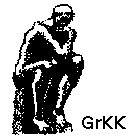Doctoral Program in Cognitive Science, Research Project:

Research Group:
Language Development
and Language
Development Disorders
|
Possession and Possessor in the Language Development of German and Italian Children
Claudia Ruff
Theme: How do children acquire a language? Which cognitive mechanisms are used and which role does the linguistic input play? In their Theory of Convergence Stern and Stern (1921) claim that children build up their own grammar before equalizing it with the adults´ rules.
|
 Claudia Ruff
Claudia Ruff
Business Card
In GrKK
from 4/97 until 9/00 as
Phd. Student
Deutsch
Italiano
English
|
Goal: I want to explore
the individual strategies children use to decipher a grammatical
system. Therefore, I will compare the acquistion of possessives
in two different target languages (German & Italian). Possessives
are interesting because they show the switch from nominal to pronominal
forms. And: For every child it is quite important to master possessives
in daily life.
Method: The child, together with his or her mother, looks
at photographies of everyday´s objects such as toys, dresses
or glasses, which belong to the child or to the parents. The mother
asks two standard questions: What is this? and: To whom
does it belong?
Problems: The experimental situation is kept as natural
as possible. However, the mothers have to be trained not to name
the objects themselves. This can lead to a non natural behavior
in the beginning.
Results (so far): Seven German and six Italian children have been videotaped for a period of about four months in intervals of about two weeks. Individual development and systematically deviations from the target grammar can be found in the data. At this point strong parallels can be found between the two languages. I am still working on the analyses of the individual developments of the children.

